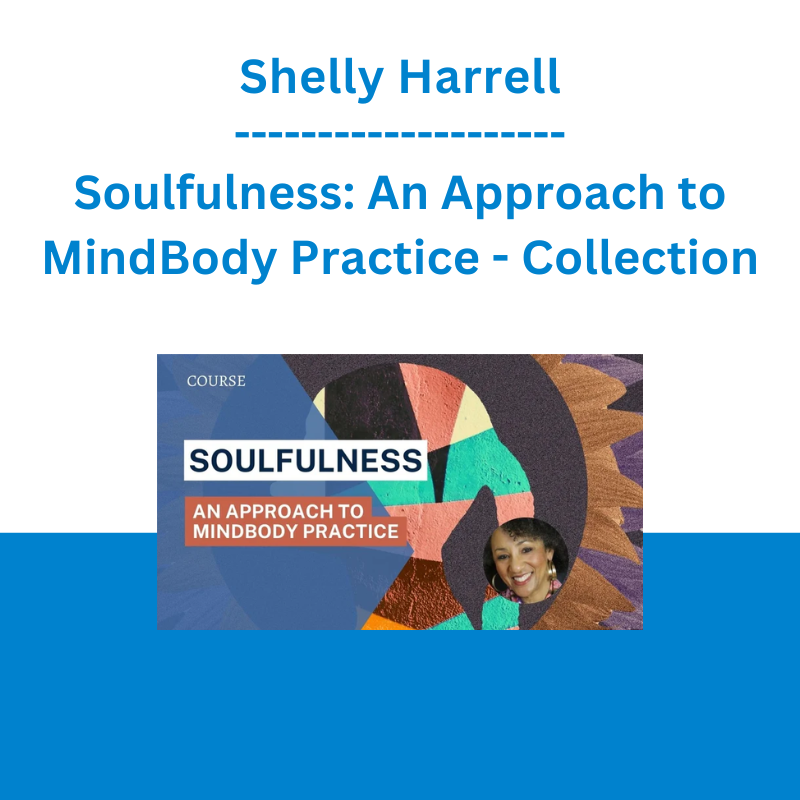*** Proof of Product ***
Exploring the Essential Features of “Shelly Harrell – Soulfulness: An Approach to MindBody Practice – Collection”
About
This course will introduce “soulfulness” as an orientation to mindbody practice that centers contact with our deep, interconnected, and embodied inner aliveness as a healing resource. The soulfulness approach is particularly inspired by the culture, wisdom, and spirituality of African and the African diaspora. Cultural dimensions of mindbody practice will be explored with special attention given to mindfulness. The principles and domains of the SOUL-centered (Soulfulness-Oriented, Unitive, Liberatory) practice framework will be presented and key practices will be demonstrated.
Soulfulness has particular value for healing, resilience, and liberation in the context of racial and oppression-related trauma. Strategies for using the SOUL-centered approach for addressing the 5 D’s of oppression (disconnection, dehumanization, destruction, delusion, and disempowerment) will be offered. This approach may be particularly resonant with BIPOC populations, as well as others who experience intersectional oppression.
While the soulfulness orientation was developed centering diasporic African cultural elements and the experience of oppression, healing principles relevant to our shared humanity and human suffering are embedded in the approach. This course is appropriate for health and wellness professionals, as well as those seeking to expand and enrich their personal practices.
Module 1: Soulfulness and SOUL-Centered Practice
This module will provide an in-depth introduction to soulfulness as an orientation to contemplative and mindbody practice that incorporates attention to sociocultural factors. Soulfulness is conceptualized as “an interconnected and embodied inner aliveness”. The SOUL-Centered Practice (SCP) framework will be presented. This includes the seven soulfulness principles that are grounded in an African-centered cultural orientation, and the five domains of soulfulness practice.
Module 2: Oppression and Liberation: Soulfulness as Reconnection, Refuge, and Resource
In this module, we will explore the relevance of soulfulness to healing oppression and facilitating liberation. We will unpack the 5 dynamics of oppression (destruction, disconnection, dehumanization, delusion, and disempowerment) and focus on how SOUL-centered practice can be a resource for healing racial and oppression-related trauma.
Module 3: A Soulful Approach to Mindfulness
This module will explore a soulfulness orientation to mindfulness practice. Particular attention will be given to the consistent emphasis on liberation, the infusion of culture, and the use of music. An overview of the “Soulful Introduction to Mindfulness” course curriculum will be provided.
Module 4: Experiencing SOUL-Centered Practices
A range of soulfulness practices will be shared in this interactive module. Examples will be provided from the five SCP domains: Breath and Body Practices, Inner Awareness and Attunement, Ubuntu Practices, Collective Wisdom Practices, and Creative-Expressive Practices. Attention will be given to facilitating soulfulness practices and their integration into the provision of health and wellness services.
People who take this course will be able to:
Describe the soulfulness approach to mindbody practice with attention to the characteristics that would make a practice “soulfulness-oriented”.
Explain the centrality of interconnectedness in a soulfulness orientation.
Identify the principles and practice domains in the SOUL-Centered Practice (SCP) framework.
Discuss how soulfulness is a liberatory practice relevant to healing racial trauma.
Describe the 5 Ds of oppression and associated soulfulness-oriented healing processes.
Describe the soulfulness approach to teaching mindfulness.
Describe the ways that culture and cultural expressions are considered in soulfulness practice.
Identify at least 3 specific soulfulness practices.
Author
Shelly P. Harrell
Dr. Shelly Harrell is a Professor at Pepperdine University’s Graduate School of Education and Psychology and Director of the Culture, Wisdom, and Resilience Lab. Her current work focuses on developing culturally-responsive, “soulfulness”-oriented interventions that utilize contemplative practices (meditation, mindfulness) and cultural expressions of wisdom (quotes, poetry, music) to facilitate resilience and liberation– internally, relationally, and collectively. She has published and presented extensively on sociocultural and sociopolitical aspects of stress, racism and well-being, cultural competence, and Black mental health. Dr. Harrell is a practicing psychotherapist, certified meditation teacher, and has conducted workshops and trainings for numerous educational, social service, health care, and professional organizations.
Please see the full list of alternative group-buy courses available here: https://lunacourse.com/shop/










 Dave Landry - Stock Selection Course
Dave Landry - Stock Selection Course  Atlas API Training - API 570 Exam Prep Training Course
Atlas API Training - API 570 Exam Prep Training Course